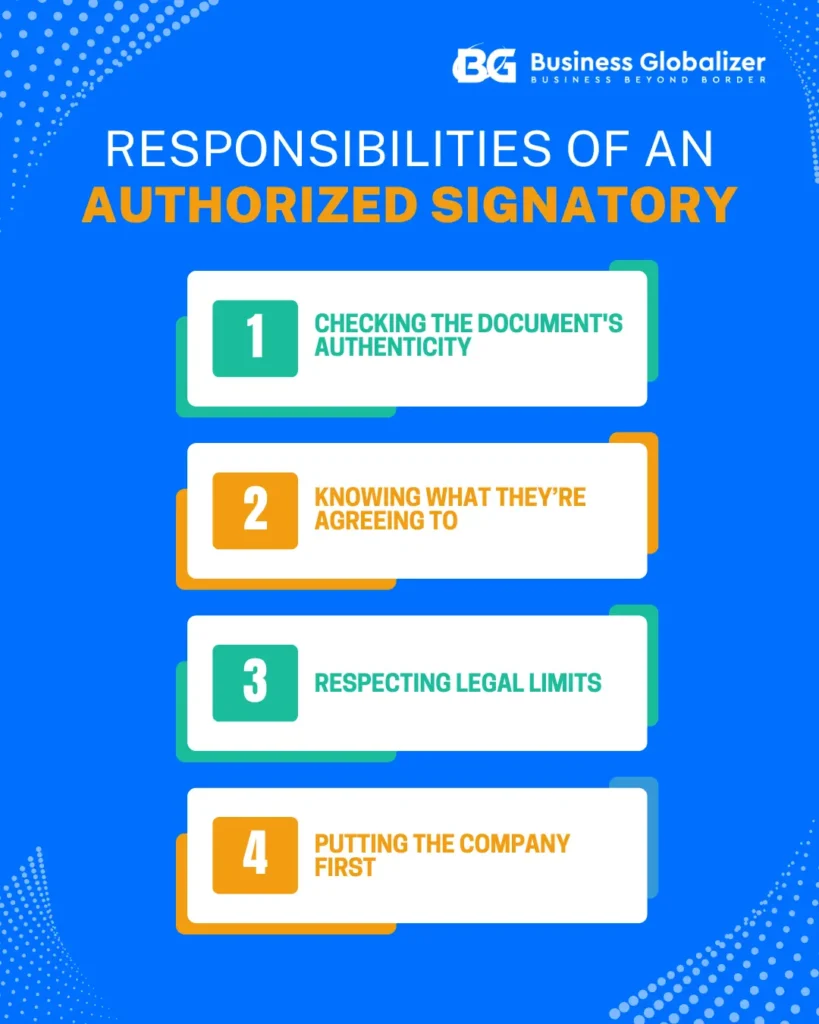They say a signature is just ink on paper—until that said signature speaks for your entire business. That’s the power an authorized signatory holds. They don’t wear a crown or sit in the spotlight, but nothing official moves without their hand.
Think of authorized signatories as the steady voice behind your company’s promises—the one who signs the dotted lines, opens the doors to bank accounts, seals deals, and gives your business the green light to operate.
It’s not about status actually. It’s about trust. Because when it really matters, the person with the pen carries the weight of the whole company. And that’s exactly what we’re unpacking here.
Authorized Signatory Meaning
Being an authorized signatory means you have the legal backing to act on behalf of a company. Your signature isn’t just your own—it represents the business. Your actions, including signing a contract, approving payments, or opening accounts, are officially seen as the company’s decisions. It’s a role built on trust, responsibility, and legal authority.
What Is an Authorized Signatory
An authorized signatory is the individual who is legally allowed to sign papers and make choices for a company or organization. But this job isn’t the same for everyone. Depending on the country, industry, or even the type of agreement, the meaning can change here and there.
Historically, “signatories” were countries agreeing to treaties. Today, it may be the CEO of your organization, the head of a department, or even two team members signing together.
Signing anything is more than just putting your name on it; it also entails taking on the duties that come with being a signatory. You’re not only signing your name on paper but also making sure the organization sticks to its commitments. This job gives you actual power, whether it’s in business, finance, or law. And with that authority comes real responsibility. It’s a position built on trust and carries significant legal weight.
Types of Authorized Signatory
Not every authorized signatory holds the same weight, and that’s intentional, even logical also. The role is all about trust, responsibility, and knowing who should be able to say “yes” on paper. Let’s talk about some real-world types of authorized signatory:
Full Authority: This person can sign pretty much anything—contracts, checks, deals—you name it, no extra approvals needed. This kind of authorized signer is usually the founder or CEO with this kind of wide-open access.
Limited Authority: The persons with limited authority are only permitted to sign off on very specific things, such as team spending or purchase orders. This type of authority is great for department heads or mid-level managers who are in charge of the day-to-day.
Joint Authority: For anything to go through, at least two persons (or more) must sign. You’ll see this setup in bigger decisions—like business loans or big-ticket contracts—where one signature just isn’t enough.
Conditional Authority: The signer can’t act until someone else gives the okay. For example, a purchasing officer might need finance team approval before saying yes to a large order.
Company Signers: These are trusted team members or directors—folks who handle vendor agreements, official paperwork, or internal approvals. Companies usually lay this out in their delegation policy.
Bank Account Signers: Here’s something important: if an authority signer is going to help open or manage your business bank account, they’ll usually need to have at least a tiny ownership stake in the company. U.S. banks often won’t allow access otherwise, no matter how trusted they are.
Trading Authorization: Investors sometimes let brokers or advisors trade on their behalf. The level of control depends on what’s agreed—some have full access, others are more limited.
Who Can Be Authorized Signatory of a Company
Generally, anyone who can legally sign a contract can act as an authorized signatory. This often includes business owners, directors, or trusted employees. But there are a few exceptions worth knowing.
People under 18, those declared bankrupt, with certain mental disabilities, or under the influence at the time of signing may not be eligible. Some contracts also require someone with specific authority, like a company director.
Also, individuals with a very poor credit score might face restrictions, especially when signing for financial matters like opening a business bank account.
Why Is an Authorized Signatory Important?
So, let’s explore a vital point: the importance of an authorized signatory. Why are they actually needed?
Prevents Unauthorized Actions
Choosing specific, trustworthy signers lowers the possibility of mistakes or abuse. When it’s apparent who can sign, no one else does so by mistake or by making an assumption.
Makes Sure the Legal Compliance Is Being Followed
When someone knows what they’re doing, they can take care of important stuff—like contracts—without needing to chase down the owner every time. That way, things get handled properly, and nothing slips through the cracks.
Makes it Easier to Make Decisions
You can offer people signatory positions based on their department, how senior they are, or what kind of contract they hold. This helps streamline operations, especially in busy teams or larger companies.
Supports Approval Hierarchies
For sensitive agreements, you can set up layers of approval. This structure makes it easier to handle high-stakes documents without confusion or delays.
Builds Organizational Trust
Giving employees signing authority shows that you trust their judgment. This small gesture can boost confidence, respect, and overall team engagement.
Responsibilities of an Authorized Signatory

An authorized signatory is very important for making sure agreements are genuine and legally valid. It’s not enough to just sign something; you have to watch out for everyone’s best interest.
Checking the Document’s Authenticity: Before signing, they should make sure the document is real and that all the provisions match what they agreed to. This helps stop fraud and lying.
Knowing What They’re Agreeing To: They should fully understand the terms, rights, risks, and responsibilities behind any contract, financial deal, or legal document they’re signing. One rushed signature can trigger serious, long-term trouble.
Respecting Legal Limits: Sure, they can sign documents. But certain actions, like selling off company assets or closing the business, may need higher-level approval.
Putting the Company First: Every decision they make should protect the company’s values and future, while staying fully within legal and ethical lines.
When Does Your Business Need an Authorized Signer?
In some cases, a signature from an authorized signatory is not only helpful but necessary. Let’s talk about those cases:
Sponsored Projects
When a company funds research or collaborations, legal agreements must be signed by someone with official authority.
Technology & IP Transfers
Handing over patents, software, or inventions requires binding agreements, only valid when signed by an authorized signatory.
Procurement & Vendor Agreements
Whether it’s leasing a new office or buying equipment, purchases must be signed off by someone legally recognized.
Immigration Paperwork
Hiring international employees? Visa and immigration forms often need an authorized signatory to validate them.
Financial Operations
Opening business bank accounts, approving payments, or managing loans—none of it happens without the right person signing on behalf of the company.
How To Make Authorized Signatory
Appointing an authorized signatory isn’t complicated, but it needs to be done properly. First, choose someone you fully trust. Then, make it official—usually through a board resolution, operating agreement, or a power of attorney, depending on how your business is structured.
You’ll also need to inform banks or other relevant parties, who may ask for ID, supporting documents, or even proof of ownership. Some banks won’t allow a signer unless they hold at least a small share in the company.
Need help? Business Globalizer offers a hassle-free Authorized Signatory service, with access to 100+ verified U.S.-based signers. We handle the legal paperwork, so you stay focused on growing your business.
Is It Possible to Change or Revoke an Authorized Signatory—and How Does It Work?
Yes, you can, but it’s not always as easy as just crossing off a name. It’s quite complicated. You can change or take away someone’s signing authority if there is a change in staff, structure, or trust.
The process usually follows your company’s bylaws and may require board approval. After that, you need to formally tell banks, legal organizations, and any other parties the signer has previously dealt with.
That being said, things might get a little tricky depending on how your company is set up and where you live. You could have to deal with legal requirements, documentation, and compliance steps.
It’s not too hard, but you need to do it right to keep your business safe and make sure the former signer can’t get in or have any power.
When the Wrong Person Signs: What You Need to Know
If someone without proper authority signs a contract, it doesn’t always make the agreement invalid. Here’s why:
First, signatures—digital or handwritten—are legally binding. So, the person who signed is responsible for what they agreed to.
Second, there’s something called apparent authority. The business may still be on the hook if a third party, such as a supplier, really thinks the signer had the right to speak for the company.
That means a purchase might still go through even if it doesn’t have formal approval, and your business could be in trouble.
Bottom line? Always double-check to see who can sign. This is a tiny step that could keep you from getting into a lot of trouble later.
Key Insights
- An authorized signatory isn’t just signing; they’re making legally binding decisions on behalf of a company. Their pen carries real weight.
- It’s not about your status or rank. This job is based on trust, legal accountability, and making sure the company’s interests are safe.
- Not all signers have the same power. Some can approve everything, while others need extra approval or must sign alongside someone else.
- Business owners, directors, or even trusted employees can be signatories, as long as they meet the legal criteria and have the company’s confidence.
- Assigning official signatories isn’t just paperwork; it keeps things secure, helps you stay compliant, speeds up approvals, and builds trust across the board.
- A signatory needs to read what they’re signing, know what it means, stay legally sound, and always keep the company’s best interests in mind.
- Whether it’s a contract, a bank form, a vendor deal, or onboarding an employee, nothing really moves without the right person signing off.
- Companies can officially assign or revoke signing authority through board resolutions, agreements, or legal filings.
- If someone unauthorized signs, the deal may still be valid under “apparent authority,” meaning the company could still be held responsible.
- A signatory is the trusted hand behind a company’s biggest decisions. When they sign, the entire business stands behind that commitment.
FAQs of Authorized Signatory
How many people should be given signature authority in a company?
Honestly, it really depends on how your business is structured. But in most cases, having two or three authorized signers just makes life easier. It keeps operations flowing, especially if someone’s out sick or away. That way, things don’t get stuck, and your business keeps moving without delays.
Who can be an authorized signatory in a company?
It’s not limited to just the CEO or founder. You can name anyone you genuinely trust; like your CFO, a senior team member, a board director, a shareholder, or even a dependable employee. What really matters is that they know exactly what they’re signing and are confident handling that kind of responsibility.
What do you call someone who signs on behalf of a company?
They’re usually called an authorized signatory (or authorized signer). Sounds formal, but it simply means they’ve been officially approved to sign off on things for the company.
Can a non-owner be an authorized signatory?
Absolutely. But here’s a heads-up: in some cases, especially when opening a business bank account, banks or authorities might ask that the person hold a small share in the company too. Just something to keep in mind.
Can I have different people sign different types of documents?
Absolutely. Some companies give limited authority to certain people, like having one person sign contracts and another handle financial documents. It all depends on your internal policies.
Does the role come with legal responsibility?
Absolutely. When you’re an authorized signatory, your signature isn’t just a formality; it carries real legal weight. Even if you’re signing for someone else, you’re still on the hook to keep things above board and make smart, lawful choices for the company.






